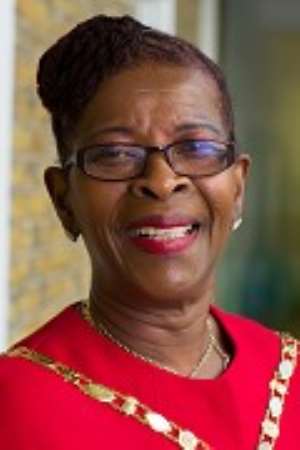
Nurses and midwives were on Thursday encouraged to provide quality care with commitment in the midst of the numerous constraints that confront their profession.
They were encouraged to remain resolute in the performance of their duties in the face of the huge pressures arising from the increasing diseases burden against scarce financial, infrastructural and limited human resources in the health sector.
Dr Cecilia Akrisie Anim, the President of the Royal Collage of Nursing, United Kingdom (UK), gave the encouragement in her keynote address in Accra at the Third Dr Docia Kisseih Memorial Lectures, instituted by the Ghana Registered Nurses and Midwives Association (GRNMA).
She said the lectures, which were instituted in 2015, were to honour Dr Docia Kisseih, who was the Founder and First President of the GRNMA, and a model of Nursing and Midwifery practice in Ghana.
They were to motivate the present generation of nurses and midwives and inspire them to great accomplishments to, hopefully, write away the wrong impressions and perceptions of the profession.
Dr Anim said although some negative experiences had created a dent on the image of the profession, nurses and midwives could only provide the expected care if they were given the requisite skills and resources to work with.
They must also be given due recognition and respect by both the Government and the public for their invaluable services.
She called for improved investment for higher education and training for this core group of healthcare professionals, saying their services were indispensable, especially in the era of global widespread communicable and non-communicable diseases, most of which required long-term care and treatment.
Dr Anim, focusing her talk on Dementia, which was a disease that results in the loss of cognitive functioning including thinking, remembering, reasoning, and behavioural abilities to the extent that it interferes with a person's daily life and activities, called for sustained support care for sufferers, their families and carers.
She said people with dementia may have impairment with their memory, language skills, visual perception, problem solving, self-management, and the ability to focus and pay attention, and could not control their emotions.
Those, she said, could result in a change in their personalities depending of the severity, where some may depend completely on others for basic activities of living.
Dr Anim said statistics from 2017 showed that 10,000 Ghanaians were living with dementia from age 40 and above, compared to the 850,000 in the United Kingdom.
Africa currently has a dementia population of four million, and called for intensified public awareness and education on the disease as a medical condition and not an old age disorder, giving the alarming statistics, she said.
Dr Anim called for effective partnership with families and carers of dementia patients to ensure effective support, insisting on a cultural shift to change the perception of people living with the disease being associated with witchcraft and needing spiritual interventions.
She said the knowledge and skills of healthcare professionals must be improved to ensure inclusive service provision.
She urged the Government to work with professional associations like the GRNMA, the Alzheimer's Society of Ghana, and the public, to lobby for quality investment for dementia care, and to build on the good work already being done.
She urged the GRNMA to take the lead in creating 'Dementia and Delirious Care Champions' for community outreach services, and to provide education on the symptoms for early interventions.
Ms Eva Mensah, the Director of Nursing and Midwifery Services, Ministry of Health, who represented the Minister, said the Government acknowledged the great contributions of those core group of health professionals in the midst of the numerous challenges.
She, however, urged the members to continue with their good work as the Government made efforts to mobilise more domestic resources to achieve Universal Health Coverage.
Dr Kwaku Asante-Krobea, the President of the GRNMA, outlined some of the constraints of the profession as poor conditions of service, unhealthy working environment, and low staff morale, and called for urgent redress.
Dr Mary Opare, the Head of the Department of Nursing at the Central University College, described Dr Docia Kisseih as an epitome of great excellence in nursing, who persevered through hard work to improve upon her skills against the odds of her time, which was worthy of emulation.




 "I can now see clearly with my two eyes, thanks to the generosity of Afenyo-Mark...
"I can now see clearly with my two eyes, thanks to the generosity of Afenyo-Mark...
 Election 2024: Power outages will affect NPP – Political scientist
Election 2024: Power outages will affect NPP – Political scientist
 NPP is 'a laughing stock' for luring 'poster-stickers', 'noisemaking babies' wit...
NPP is 'a laughing stock' for luring 'poster-stickers', 'noisemaking babies' wit...
 Dumsor: Matthew Opoku Prempeh must be removed over power crisis – IES
Dumsor: Matthew Opoku Prempeh must be removed over power crisis – IES
 PAC orders WA East DCE to process requests from their MP
PAC orders WA East DCE to process requests from their MP
 Defectors who ditched Alan’s Movement to rejoin NPP were financially induced – A...
Defectors who ditched Alan’s Movement to rejoin NPP were financially induced – A...
 Dumsor: Akufo-Addo has taken Ghanaians for granted, let’s organise a vigil – Yvo...
Dumsor: Akufo-Addo has taken Ghanaians for granted, let’s organise a vigil – Yvo...
 April 23: Cedi sells at GHS13.66 to $1, GHS13.07 on BoG interbank
April 23: Cedi sells at GHS13.66 to $1, GHS13.07 on BoG interbank
 GRA clarifies tax status of resident individuals earning income abroad
GRA clarifies tax status of resident individuals earning income abroad
 2024 elections: NDC to officially unveil Jane Opoku-Agyemang as running mate tom...
2024 elections: NDC to officially unveil Jane Opoku-Agyemang as running mate tom...
